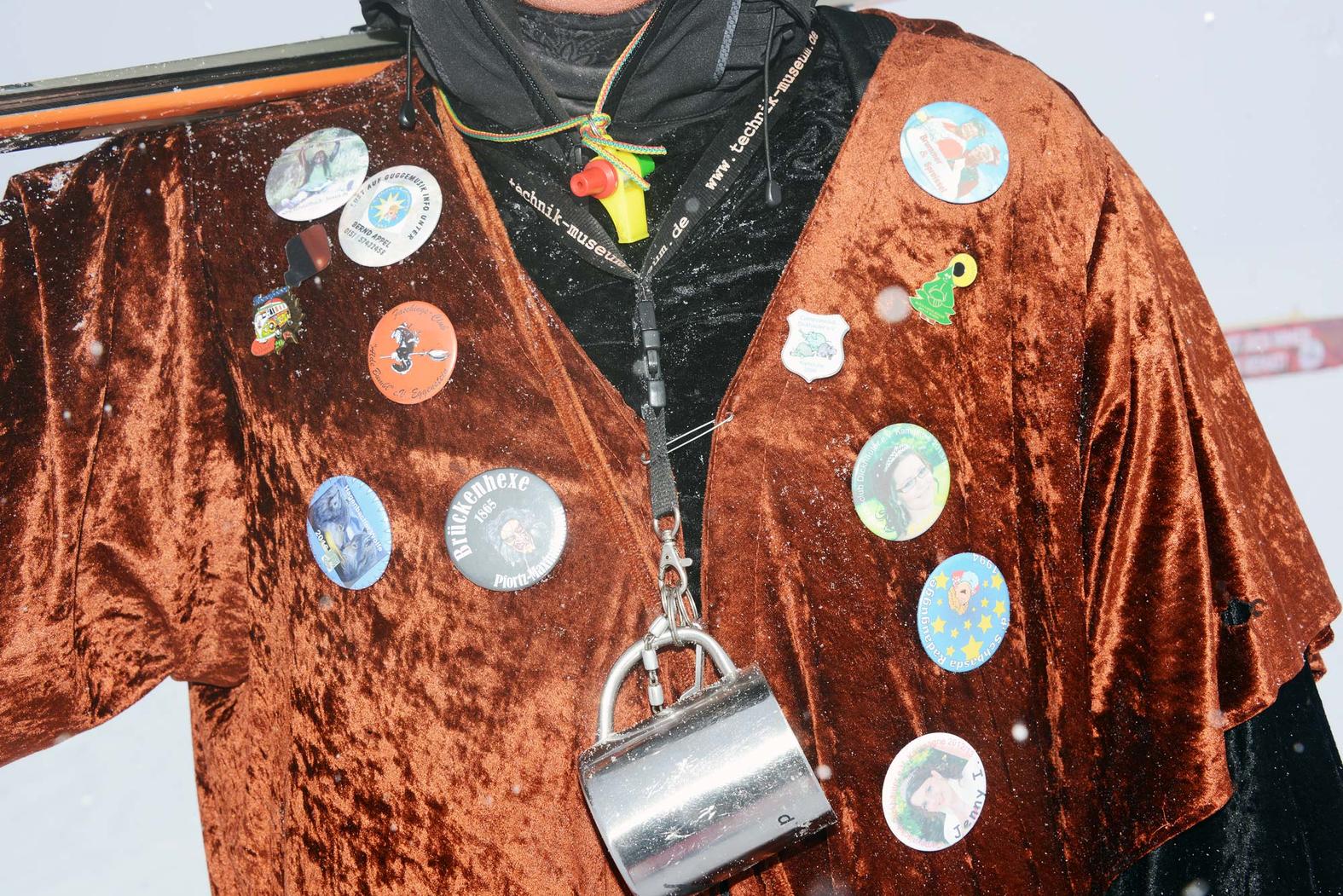Back in November, Sony released the PS4 Pro, a more powerful system promising improved graphics, as well as 4K resolutions and High Dynamic Range Color. With the Pro, Sony is banking on the idea that people will see the advantages in a technology that's far from mainstream, and not yet standardized.
Microsoft, Sony's biggest competitor, is also aiming at this market with Project Scorpio, a system they've said will bring even greater performance. It's a gamble that's proven useful before—the Xbox 360 set HD as a minimum standard long before HDTVs were mainstream—but there's a sense of insecurity surrounding all this talk of 4K. People are already claiming that his generation has become outdated, and the easiest way to assuage those fears is to give them more power, and bigger numbers. These large companies are deeply invested in the idea that greater technology means better art.
Meanwhile, there's a growing number of artists intentionally pushing in the opposite direction. There's an increasing appreciation for the artifacts and flaws of older technology, in the same way that the pristine quality of digital sound has influenced a resurgence in vinyl and cassettes.
Read more on Waypoint
The Undeniable Beauty of Low-Fi Gaming
Environmental Activists Plan to March on Washington April 29
Thanks to the millions of people who donned pink pussy hats all over the world last Saturday in solidarity with the Women's March on Washington, environmental activists are now organizing a march in order to send their own message to the Trump White House. They've staked out April 29, the Saturday before Trump's 100th day in office, for the People's Climate March.
The march is being steered by 25 different organizations, including the Sierra Club, the NAACP, Service Employees International Union, US Climate Action Network, and the Hip Hop Caucus—which hopefully means that there will be some really great entertainment lined up for the event.
"There is no denying it: Donald Trump's election is a threat to the future of our planet, the safety of our communities, and the health of our families," organizers wrote in a statement. "This new administration is attacking the hard-won protections of our climate, health, and communities, and the rights of people of color, workers, indigenous people, immigrants, women, LGBTQIA, young people, and more."
The announcement comes at the end of a difficult week for both green activists and those working for federal environmental organizations. On Tuesday, Trump signed a pair of executive orders that could advance the controversial Keystone XL and Dakota Access pipelines and then placed a press gag order and grant freeze on the Environmental Protection Agency. A member of his transition efforts also confirmed that the agency's scientific studies would be reviewed and placed on a "temporary hold."
Greenpeace activists responded Wednesday by climbing a 270-foot crane at a construction site near the White House and hanging an enormous banner that read "RESIST." An employee from Badlands National Park also kicked off an apparent Twitter campaign among National Park Service workers, after tweeting out various science and climate change facts from the park's verified account. Official Twitter accounts from Golden Gate, Death Valley, and Redwoods National Park followed the day after.
Now those who sympathize with these climate justice warriors and want to voice their concerns on the way the new administration is handling environmental issues are being encouraged to meet up in DC at the end of April. And if you're not able to make it to that march, there's also a Tax Day March set for April 15 (to demand the president release his tax returns), plans for a National Pride March to coincide with DC's annual Capital Pride celebration June 8–11, and a Juggalo March on Washington September 16.
White House Adviser Steve Bannon Says Media Should 'Keep Its Mouth Shut'
In a phone interview with the New York Times, Steve Bannon, Donald Trump's chief strategist, echoed sentiments of his boss's "running war" with the media and allegedly lashed out at the press, calling journalists the "opposition party."
"The media should be embarrassed and humiliated and keep its mouth shut and just listen for awhile," Bannon said. "I want you to quote this: The media here is the opposition party. They don't understand this country. They still do not understand why Donald Trump is the president of the United States."
Bannon, who used to run the right-wing website Breitbart News before becoming one of Trump's most influential advisors, reportedly reached out to the Times to talk about Sean Spicer, the White House press secretary. Spicer—who has said that "if you lose the respect and trust of the press corps, you've got nothing"—has come under fire this week for touting "alternative facts" about the size of Trump's inauguration crowd and defending the president's debunked voter-fraud claims.
When asked if he thought Spicer had lost some of his credibility with the media, Bannon apparently said, "We think that's a badge of honor. 'Questioning his integrity'—are you kidding me? The media has zero integrity, zero intelligence, and no hard work."
Why the 'Fuck You, Pay Me' Ethos Is More Important Than Ever in the Trump Era
For a month and a half last year, I poured myself into an exciting and fulfilling project for a growing company full of passionate, hardworking, and talented individuals. It was an all-hands-on-deck operation with many moving parts, late nights, and learning, as everyone involved took their first stab at this particular sort of endeavor. Our efforts were ultimately rewarded with all the pieces of the puzzle somehow magically coming together. We patted one another on the backs, the company leadership gave proud, beaming speeches, and everyone took some much-earned time to decompress and recharge.
And then they ignored my invoices and stopped returning my emails.
My story is a relatively common and old one. People have been stiffing bills since they were written on clay tablets. Debt payment is covered extensively in the 1780 BC Hammurabi Law Code. According to Hammurabi, my delinquent former employer ought to be selling himself, his wife, or his children into slavery to make things right, but I'd still be happy with just a check.
As the "1099 Generation" becomes increasingly dependent on side hustles—primarily due to the lack of more traditional, stable employment options enjoyed by our parents—we're also increasingly at risk of those holding the purse strings fucking us over. As most Americans have less than $1,000 in their savings account, a delinquent payment can absolutely devastate a freelancer who may be working constantly and just getting by, unsure of when money owed to them will arrive. Even if small claims court or arbitration were to finally squeeze payment from the employer—a contract is a contract, after all—the processes are typically lengthy, and the ripple effects of not having enough to cover a phone bill or rent might already be irreparably damaging and life-changing.
New York City, recognizing the myriad vulnerabilities non-employee workers face in the shifting job landscape, passed a first-of-its-kind wage-theft protection measure referred to as the Freelance Isn't Free Act in October 2016. The bill requires written timetables for collecting payment and imposes penalty fees on those who drag their feet when compensating work done.
What should be cause for concern for freelancers (or anyone who subscribes to the idea of "honest work for honest pay") is that our new president, Donald Trump, has a litany of lawsuits—more than 3,500 in three decades—filed against him, primarily alleging failure to pay contractors for their labor.
Bragging in a 2015 Wall Street Journal article that he often unilaterally re-negotiates a contract after completed work, Donald Trump equates his slimy manipulation of the legal system and the imbalanced power dynamic between a multimillionaire and blue-collar workers with business acumen. Trump has repeatedly preyed on those he contracted (usually mom-and-pop shops or individuals) with the understanding that the prospect of having to hire a costly attorney to collect payment would invariably net them much less than what was originally promised on paper, thus forcing them to settle for an amount somewhere between the two figures if they want to get paid in a reasonable amount of time or at all.
Even for his inauguration day, Trump's ex-wife Marla Maples and daughter Tiffany attempted to convince a freelance hair-stylist to work for free "for the exposure." Anyone who's ever job hunted on Craigslist can attest to the frequency with which this particular dubious reward is offered.
While most of us will likely never engage in business with the Trumps or their companies, one should be wary that, just as Donald Trump's racist remarks emboldened the bigots of America to come out of the woodwork, so to might his unabashed business fuckery embolden America's capitalist swindlers.
Fighting the good fight out of principle is a luxury few in lower socioeconomic statuses can afford. Like most things in life, the legal avenues for remuneration invariably favor the rich, who have their base layers of Maslow's hierarchy squared away. Furthermore, they enjoy more of a financial runway to work with should litigation become protracted.
Economic policy–based think tank the Manhattan Institute has advocated for the adoption of "English rule" for attorney fees, wherein the losing party foots the bill for everyone. Though primarily concerned with curtailing frivolous tort litigation levied against small businesses, the group acknowledges that such a revision to the justice system would also "ensure plaintiffs of modest means but strong legal cases access to justice."
Such a seismic shift seems unlikely to happen soon, at least in whatever amount of time Trump has remaining in office, which is why it is so important for the generation of permanently partially employed young adults coming of age to be more forceful than ever when collecting their dues. A key component of resistance in the Trump era will be doggedly demanding your money as tenaciously as you will have to demand your inalienable human rights.
We are living in vulgar times. We can either weaponize that vulgarity for righteous purposes or allow it to be used to oppress us. It's time to dust off the unofficial motto of the freelancer, "fuck you, pay me." Lifted from Martin Scorscese's seminal classic Goodfellas, the phrase succinctly captures the inherent enmity lurking beneath the surface of all commerce.
"Fuck you, pay me" needn't be said out loud to be applied. Adding in late fees to contracts and invoices, meticulously enforcing due dates, or even leaving an unfavorable Glassdoor review are as much tools for collecting money in the present as they are your obligation to those workers who will hired at a later date.
Arriving at "fuck you, pay me" with a company is typically a point of no return and one to be avoided whenever possible. There's no reason to fully burn a bridge with a corporation or small business that is facing an unexpected financial hardship and has been forthcoming and communicative about the issue. Especially if this is the first time it's happened. But if you find yourself getting the runaround and cold shoulder as you come to collect, it's time to dispense with the pleasantries. Would they be granting you the same civility were your roles reversed?
Though I've still yet to be paid, I haven't quite reached "fuck you, pay me" status with the company I mentioned above. They're well past the archaic "net 30" payout timeline, but I'm not in dire financial straits. I'm willing to chalk the entirely unacceptable turnaround time up to the disorganization, incompetence, and poor communication of a few individuals. I'm still holding on to the positivity I feel about the majority of my experience there and ascribing no malice to the delay.
That said, after November's election, I am a bit less trusting of the inherent good that's supposedly inside my fellow man. Last fall, I was looking forward to a presidential term of human rights expansions and progress as a nation. Today, I'm keyed up to get into street fights with Nazis. I'm going to ride these waves of hopefulness for an amicable resolution for as far as they'll take me, but once we've reached "fuck you, pay me," I'll be ready to direct my itch and energy for scraps with white supremacists to whatever entity is standing between me and what's mine.
A Burger King Was Allegedly Selling Weed to Customers Who Asked for 'Extra Crispy Fries'
A couple of fast-food employees in New Hampshire are now facing charges after they were busted for selling weed out of the drive-thru of their local Burger King, Seacoast Online reports.
The two masterminds, Garrett "Nasty Boy" Norris, 20, and his alleged accomplice Meagan Dearborn, 19, were apparently selling marijuana to customers who came to the establishment and specifically asked for "extra crispy fries."
It's not clear how long the pair was running their side hustle before police in the town of Epping—population 6,144—caught on. Last Saturday, an undercover cop pulled up to the restaurant, asked if "Nasty Boy" was working, and then placed his order with a side of extra crispy fries. Norris then reportedly gave the guy his Whopperito or whatever, along with a coffee cup full of pot.
Norris was charged with possession of an unlawful substance and intent to distribute. Dearborn, an assistant shift manager, was also arrested and charged with conspiracy to distribute and unlawful possession of alcohol. They were both released on $2,500 bail and will be arraigned next month.
Unfortunately, for Nasty Boy Norris and Dearborn, New Hampshire's state legislature voted down a bill to legalize recreational marijuana, so they may want to think about taking their business model to one of the many states that has legal weed. In fact, Oregon already has its own drive-thru for smokeable green stuff. Sadly, though, you'll have to make an extra stop for an Oreo Cookie Cheesecake.
Trump’s Mexican Border Wall Would Be an Ecological Disaster
President Trump signed an executive order on Wednesday pushing ahead one of his signature campaign stumps—the construction of a massive $14-20 billion wall along the 2,000-mile-long border with Mexico, designed to deter illegal immigrants and drugs from entering the United States.
The wall has faced fierce criticisms from human rights groups for the possible humanitarian disaster it could cause (ask Berlin about this). But if built, the wall could pose another threat altogether: ecological disaster.
A barrier would sever animal populations living in the fragile desert ecosystems of the US-Mexico border from food resources, mates, and important migration routes. Such a disruption would deal an irreparable blow to countless species, including extraordinarily rare ones like the Sonoran jaguar and Mexican gray wolf.
According to a US Fish and Wildlife Service provisional report released last year, a Trump wall covering the entire 2,000-mile border, with approximately 1,000 feet of developed space on either side,would potentially impact 111 endangered species, 108 species of migratory birds, four wildlife refuges and fish hatcheries, and an unknown number of protected wetlands.
Read more on Motherboard
Trump's Trouble with Numbers Is America's Problem Now
Back when Donald Trump was just a guy who put his name on skyscrapers, casinos, and steaks, no one needed to worry too much about his habitual exaggerations. Braggadocio comes with the territory for being famous and getting richer by playing a rich guy on TV—the public didn't want Trump to be humble any more than they wanted Paris Hilton to be bashful. He was persistently on-brand before being on-brand was really a thing. That meant, for instance, badgering Forbes in an effort to get the magazine to revise its estimates of his net worth upward. (Forbes said Trump was worth $3.7 billion at last count.) It meant being "obsessed" with the ratings of The Apprentice, according to a former NBC PR man. It meant showing up at a struggling school in the Bronx and handing out a fake million-dollar bill.
In the course of this on-brandness, Trump could, well, exaggerate sometimes. When journalist Tim O'Brien challenged him on his net worth, it led to a lawsuit during which Trump was forced to admit that his sense of his worth was based on his own feelings. When The Apprentice's ratings dipped, Trump told that PR man to keep telling reporters it was a number-one show. And he actually only gave that Bronx school $200.
None of these things really hurt anyone (well, the parents at the school were disappointed). Trump might have been a billionaire, or so he insists, but he wasn't a particularly powerful one. He was on the fringe of American life, a sideshow, a hype man, the type of dude who gets roasted on Comedy Central—where, incidentally, he demanded that no one make fun of him for having less money than he said he did.
This fuzzy math, however, is going to matter a lot more now that Trump is the most powerful man in the country—and the consequences could be more far-reaching and severe than many people think.
The federal government does a lot of things, but a major function involves tracking the basic facts of American life: how many people live in a certain place, how many of those people are out of work, how much money a bridge will cost to build, how much the IRS collects in taxes, how many pollutants are floating in our air or swimming in our water. Public officials use those numbers to make policy, journalists use them to report on various problems facing the country, average citizens can look them up if they're curious about something. Sometimes there are debates about the relative importance of certain numbers, but a great deal depends on people more or less agreeing about basic facts.
When a basic fact challenges Trump, he tends to reject it. He did some routine number-stretching during the campaign,regularly exaggerating the sizes of the large crowds he attracted to emphasize how hugely, big-league popular he was. And this habit has continued after his win: On Monday, hesent his press secretary Sean Spicer out to tell the media that more people had attended his inauguration than Barack Obama's. This sparked more debate about crowd size and invited coverage that was unflattering to Trump, but it also indicated just how insistent this administration is going to be when it comes to defending the president's assertions.
The size of a crowd is not really going to affect public policy either way. What matters more is Trump's subsequent insistence that millions of people voted illegally. On Tuesday, Spicer told the White House press corps that the president "believed" this to be true, but didn't offer any evidence. When reporters pointed out that if this were true it would be a huge scandal that should be investigated, Spicer demurred and didn't say if there were plans to investigate. Everyone, including mainstream outlets like CNN, pointed out how truly ridiculous all this sounded—but on Wednesday morning, Trump showed how far he was willing to go, calling for an investigation (via tweet) into this supposed voter fraud.
These accusations closely follow right-wing claims that it's easy for fraudsters to vote multiple times because millions of people are registered to vote in more than one state. But it's not illegal to merely be registered to vote in two different places (as White House adviser Steve Bannon reportedly is), and the fear is that crackdowns on voter fraud will just make it harder for poor people, particularly minorities, to vote, giving Republicans an electoral advantage. The millions of phony votes may just be a "belief" of Trump's, but that belief may have real-world consequences.
This is just the tip of the iceberg. Trump has indicated that he thinks the unemployment rate might be "42 percent," which is based on a faulty understanding of how unemployment is measured. When Spicer was asked on Monday what the unemployment rate is, he didn't even say, instead talking about how the Bureau of Labor Statistics (BLS) puts out "several versions" of that number. But the unemployment rate is a very specific statistic that measures the percentage of people who are actively looking for work but haven't found it, and according the the BLS, it's currently 4.7 percent. It's right there on the federal agency's website. (Since his election, Trump has also exaggerated the number of undocumented immigrants with criminal records.)
So, will Trump and his administration ignore his own government? Will certain true information that has been put out by the federal government be taken offline, a la the White House's order that the EPA remove its climate change page? Will federal employees be put in the awkward position of having to contradict their boss when he exaggerates or else follow along in his untruth? (Spicer in particular is already in a pretty miserable position; he wouldn't say when asked if he agreed with Trump about the alleged voter fraud.)
The numbers that the federal government tracks aren't fungible like the value of Trump-owned properties. They monitor realities—they are how we judge a policy's success or failure, the basis for conversations about the direction America should take. The danger isn't that the president keeps exaggerating, it's that people start thinking the government's numbers are just as suspect as Trump's.
Follow Harry Cheadle on Twitter.
Action Bronson Thinks Tokyo Is Like 'Final Fantasy VII'
On an all new episode of Fuck, That's Delicious, the gang heads to Tokyo, the next-level New York, where Action Bronson, along with the Alchemist and Meyhem Lauren, take on a variety of cuisines, rap, and sumo wrestling.
Fuck, That's Delicious airs Thursdays at 10 PM on VICELAND
Want to know if you get VICELAND? Head here to find out how to tune in.
How to Sext, According to Some Sexperts
Photo by Pro Juventute via Flickr
Sexting has become part and parcel of modern flirting. All the kids are at it, but the less said about that the better, because it's very, very shaky ground legally. For the adults, though, it's perfectly fine. It comes in many shapes and forms: it can go well, it can go incredibly badly, and it's something fun to look back on when you're bored on a long train journey.
But sexting is, in many ways, an art form, and some people's paint palettes are more colourful than others. To help you expand your range we asked a few sexperts for their sexting tips. Spoiler: there's a lot of stuff about how you shouldn't send a sweaty, grainy photo of your turgid boner, the skin pulled back to the base to emphasise the length. Oddly, people don't want to see that sort of thing.
MARGARET CORVID, JOURNALIST AND DOMINATRIX
"If we're talking about two civilians, not sex workers, the main thing is to make sure your sexting is welcome, to make sure you have consent from your sexting partner, that it's OK to have a sexy conversation. You don't have to be all serious when asking for consent, either – you can just send a little text: 'Do you mind if I talk dirty a bit ;o),' for example, before you go ahead saying I'd like to do this, I'd like to do that.
If you have consent from your partner then the next part is what are you actually going to say? Most people draw a blank on that. The best suggestions that I've found for dirty talk, whether it's verbal or sexting, is say what you would like to do and imagine you're both engaged in a sex act together. You do not need to be coming up with some elaborate fantasy with fully-fledged characters. You can just say, "I would really love to suck your cock right now," or, "I'm sucking your cock right now and it tastes so good and I'm running my tongue up and down it," or, "I just sucked your cock and you just came in my mouth and it was so hot!" or whatever. That's just a very basic example. It doesn't have to be wildly creative, just expressive.
If I'm sexting with someone, I'm not going to come out with some wild fetish or kink if I don't know that the other person will be into it. There's strange kinks people have, like stepping on balloons, and I'm not just going to start talking about that."
JILLIAN ANTHONY, SEX COLUMNIST, 'TIME OUT NYC'
"Don't go too hard right away. Stick to things that you know. If you're feeling a little unsure about what to say you can just read through in your mind what your general foreplay is. You can describe coming home, or starting to kiss them – things like that – and it can progress as it normally would. That way you don't have to imagine things too much and you can just go with what you know. Sexting has no age. It may be a different form of communication for [older people], but if you've been in a long-term relationship and you're a little older it's a great way to get excited about your relationship and get excited about going home.
I'm wary to say 'don't ever do this' because each situation is different, and each coupling will be different. People will like different things. Personally, I don't like it if it's so literal. It can be awkward all the way around if it's so literal, like, 'I am now undoing your [trousers].' Have a little fun with it.
Not everyone wants to see a dick pic immediately. Test the waters, check out how that's going, make sure that you guys are on the same page with that."
WENDY JONES, AUTHOR OF 'THE SEX LIVES OF ENGLISH WOMEN'
"People have always written to each other in sexual ways – sometimes very subtly, but it's still been there, in the 17th, 18th, 19th century. It's just that it's manipulated by new technology. We've always used it, we've always understood it.
The most important thing about sex is to enjoy it fully, and sexting and texting is a great place to be creative with language. You can be very subtle or very crude, put the volume where you want it. Obviously anything you commit to paper or electronic devices is recorded and can be used and you can be manipulated by it or shamed by it; you're committed to it. That's a boundary you have to be aware of, and doesn't it add to the frisson anyway? It's a more concrete expression than the spoken word. Listen to your instincts and don't ignore it because it's the wisest part of your system.
Spelling makes you look intelligent. Make sure you've got the right number! Seduction is better than being too explicit. Implicit is sexier than explicit, even though you're sexting. And it doesn't just stop at sexting – it should lead onto something else; some other fulfilment."

This image is called "Does it count as sexting if it's a drawing?" and is by Quinn Dombrowski via Flickr
BRIDGET PHETASY, SEX COLUMNIST FOR 'PLAYBOY' MAGAZINE
"I would say make sure you trust the person, first of all. The most important thing is knowing that it's going to be reciprocated – you don't want to come out of the gates sexting and then miss the target. Start slowly. I feel like these things kind of unfold naturally. You'll be in a conversation and then suddenly you'll be sexting, and it usually happens when you're dropping hints and the other person gets the hint and takes it to a more racy place. I think that people are smart enough to know a hint when you drop one. I think that women and men are sensitive to it. You know when somebody's suddenly shifted into a flirty place.
For a man, don't send dick pics. Unless they're requested, just don't do it. Never do it. Don't get greedy, don't beg for nudes. For women, I would say be sensitive to the time of day you're sexting. He might be in a meeting. Somebody might be in a lunch. One time, some guy sent me a dick pic and I was looking at my phone at work. My friend got sexted a second-hand dick pic, which is never a fun experience. It's one thing if you're a couple and you're like, "Babe, I have a quick meeting today," and you're sexting him knowing that because it's something you do to add to the tension. But if you've been sexting with someone and he's been in a meeting and he doesn't get back to you and then you get angry, I guess it's like: don't be hypersensitive if they're not responsive right away.
One other thing is don't ask questions you don't want to be answered. Guys are always like: "Did you take that for me?" Men and women all have, like, stock photos of your best pictures. You might be feeling ugly that day and send a stock one... but if you want to make someone feel special, it's important to take things just for them. If you're just flirting then take a bunch just for them. But inevitably the good ones end up as your stock photos anyway. These are just for you... for now. One time this guy was like, 'Take a picture with a spoon,' or licking a spoon, or something like that. It was a way for him to know it was just taken."
More from VICE:
Do Teens Actually Use These Sex Acronyms? An Analysis
How Sexting Is Changing Our Sex Lives IRL
A Sex Club for Bisexual Women Left Intimate Photos of Its Members Freely Accessible Online
Photos of Drunk Witches Racing Each Other Down A Snowy Alpine Slope
All photos by David Zehnder
This article originally appeared on VICE Alps
According to a Swiss legend, there was once a witch living near the picturesque Alpine village of Belalp. The witch was married but cheated on her God-fearing husband with a young man. The two lovers secretly met by transforming into black ravens, soaring through the crisp mountain air. When her devoted husband began to suspect something, the witch decided to get rid of him. The moment he climbed onto an old cherry tree to pluck cherries, she flew over the tree and dropped a rancid black cherry in his eye. The man lost his sight, fell down and died. The legend has it that the town dealt with the murder quite radically – she was made to confess after being tortured and was subsequently sentenced to death and burnt at the stake.
Normally every January, tourism in Belalp experiences a lull. That's why 35 years ago, hoteliers and ski instructors from the region decided to battle that quiet spell by organising a ski race commemorating the witch and her husband. Having locals and tourists alike dress up as witches, get drunk and ski down an icy slope proved to be exactly what the area needed during the slower weeks – despite the bad weather, over 1,300 people joined the witch race on the 14th of January this year. The race itself isn't about time, but about style. And about doing as many shots as possible, which explains why most witches don't make it to the finish line but get stuck somewhere on their way down the slope.
Local photographer David Zehnder was there to document this year's event.











More on VICE:
The Strange Swiss Custom of Dressing Up as a Bush and Throwing Women in Wells
'Filmmaking Is Terribly Colonial' – Talking 'T2: Trainspotting' with Danny Boyle
(Top image: Young Fathers and Danny Boyle. Photo: Imogen Freeland)
There's a mountain in Edinburgh adored by locals. It's said that its name, Arthur's Seat, is taken from the legends of King Arthur. Couples walk up it and leave love locks on the metal bars at the top. The view from up there is utterly beautiful.
In T2 Trainspotting, a rejuvenated Renton, played by Ewan McGregor, now clean from heroin, runs up it easily, followed by a sweaty Spud, played by Ewen Bremner. Quitting smack is just about finding a new obsession, explains Renton. Running could be it. At the top the pair collapse and look out over Edinburgh – the streets they were sprinting through, screaming, 20 years ago; the city whose drug culture made them disappear into carpets and be vomited out of toilets.
"Holy god! It's like Rio or Cape Town," says Danny Boyle, enthusiastically, bouncing on his toes. "There's this incredible natural thing – a mountain, really – and the whole historic city is built in a loop around it. It's a good steep walk up with extraordinary views. You can get killed up there in bad weather – people fall off. You feel it's got this huge natural force. We had a beautiful day when we were filming there."

Renton and Spud looking over Edinburgh (Still from 'T2: Trainspotting')
Most of Trainspotting was spent inside – rowdy pubs, perspiring clubs, drug den flats – and mostly filmed in Glasgow. Now, the characters are older and, for the most part, although still in love with drugs, off heroin. T2 also explores Edinburgh, the city, which seems to have evolved since the first film.
"The city doesn't change that much, because it's a historic city; it's protected by that. It's the energy of the city that's different," says Boyle. "The student population now is huge compared to 1996, when we were there. At that time it was only really posh medical students, and still is, but there's a bigger mix of them now. It feels more vibrant and more European. It's more fun to be in and I really liked living there for six months. Edinburgh seemed a bit twee before."
I'm in a hotel in central London with Boyle and Young Fathers, the Mercury Prize winning group that soundtracked T2. "Do you remember the backlash of people thinking Trainspotting portrayed this really bad image of Edinburgh?" G Hastings of Young Fathers asks Boyle. "I think the local paper wrote something about it being just about heroin. It was really nasty." Boyle remembers it well. Despite the criticism, the film made people want to visit the city – the type of people who couldn't care less about the Edinburgh Fringe Festival.
It's difficult to see how similar condemnation could be aimed at T2. As well as showing the beauty of the place, Boyle worked to get his Edinburgh right.
"Filmmaking is terribly colonial. We'll grab you, take what we want from you and then fuck off and you'll never hear from us again" – Danny Boyle
"When you start a film you try and embed yourself where the film is set and meet people and try to stop yourself being a stranger in the place," says Boyle. Edinburgh-born Irvine Welsh, who wrote the Trainspotting novel and Porno, the novel on which T2 is based, introduced Boyle to a number of people who'd been involved in HIV work in the city. "It was all about updating us on the drug issues in the city since the first film," says the director. "I met a guy who'd made this film about his own life, which is pretty brutal – brilliantly made. I made him the second unit director."

Danny Boyle (Portrait by Imogen Freeland)
Boyle has strong views on the ethics of filmmaking. "You arrive with all this money and you spend it in the city – and so does the crew, who have per diems – so there's an economic benefit, and it's why cities often encourage you to come to them. But there should be a cultural benefit to it, too. There was another guy who lived at the top of one of the tower blocks in Greendykes, and he's still a heroin addict, so we talked to him a lot and used his place as a location because then you can give him money. You're trying to pay it forward rather than nipping in and nipping out. That's always the danger... filmmaking is terribly colonial." Boyle grabs me tightly by the shoulders and shakes me to illustrate his point. "We'll grab you, take what we want from you and then fuck off, and you'll never hear from us again. So we try not to do that. Well, you are doing that, actually, but you're trying not to do it."
It took a long time to get T2 to the screen. Ten years ago John Hodge, the screenwriter of both films, tried to faithfully adapt Porno, but the unanimous feeling was that the film shouldn't be made. Plus, Boyle and McGregor famously fell out when Leonardo DiCaprio was cast as the lead in The Beach, instead of McGregor, who until that point had a special working relationship with the director. "Then John wrote something much more personal. When Renton says, 'I'm 46 and I'm fucked' and he's got '30 more years left and what the fuck am I gonna do with that?', that's John," says Boyle. "He started writing that through the prism of these characters and it didn't feel like going through the numbers of Irvine's story. It feels more raw. That's why we decided to do it. We thought it was something that we could send to the guys and they'd like."

Still from 'T2: Trainspotting'
Still, the expectation from both film critics and fans that it would bastardise the legacy of the original has loomed over T2's release. Trainspotting is legendary. For teenagers, knowing the film inside out is a piece of cultural capital akin to telling people you love Catcher in the Rye, or that Melvin Burgess's Junk speaks to you on a personal level. Think of the money HMV must have made from people buying the "Choose Life" posters. For kids growing up in Edinburgh, like the guys in Young Fathers, it was, as Kayus Bankole says, "a bible".
"The film is a rite of passage and was something to be proud of growing up," says Alloysious Massaquoi. "I used to hang around with older guys, and I thought, 'I know people like this in the film – these nutters.' It felt real. On top of that, it was a hit film from where I was growing up with Scottish people in it." G Hastings adds: "It was the first time I'd ever heard someone that talked like me in a film. Irvine Welsh had a cameo and he's from the same area that I'm from, so he spoke in a north Edinburgh accent. I can't imagine watching the film as people outside Edinburgh would watch it."

Renton and Sick Boy in a still from 'T2: Trainspotting'
One contributing factor to the original film's cult appeal was its soundtrack. By his own admission, Boyle used to be "fucking good" at picking soundtracks. Now, it's more difficult: "As you get older, someone mentions a band and you go, 'Who are they?'"
Young Fathers' music is what he settled on for the new "heartbeat" of Edinburgh. "It was only afterwards, when we were doing the publicity, that I realised this music is born out of the same place where Irvine wrote the stories and the characters," says Boyle. "There's that connection. We used three or four of the tracks, but we could've used another half dozen. You could've done the whole film with it."
It wasn't just the music that had to be perfect – the actors had the performances of most of their careers to compete with. "They were anxious. You could tell they were. They didn't want it to be shite," admits Boyle. "It'd be so humiliating if it was terrible." As an apparent attempt to address the enormity of the original film, T2 is extremely self-referential. There are flashbacks, much is made of Spud's storytelling of the Trainspotting years and Renton even attempts an updated Choose Life speech for 2017.
"The first film was almost an artefact, and the characters know the first film exists," Boyle says. "There's actually only one minute of Trainspotting in this film. It seems like a lot more, but it isn't. We used that as a resource to draw on, and the actors knew it would make them look bad. Who looks better in their mid-forties than they did in their mid-twenties? They knew it would be tough like that. But it connects them back with us because movie actors often feel like they're different from us, yet they're ageing like we all do. It's the common fate of all of us."

Spud in a still from 'T2: Trainspotting'
What T2 does do well is depict a group of men making a very weak attempt to leave the past behind. Renton's come back to Edinburgh, despite fucking off forever to Amsterdam, and it's all of 15 minutes before the characters are up to their old tricks. The pull of place is enduring; if only they could get out of Edinburgh, maybe they'd be able to cut ties with all those toxic people and toxic substances, and change their own poisonous behaviour.
"I come from Manchester and it's the same thing – you think, 'I'll leave and I'll make progress,' but you'll end up there," says Boyle. "They say that 93 percent of British people die within seven miles of where they were born. You end up going back where you started."
In Trainspotting, we saw Renton swigging vodka, telling us: "It's shite being Scottish. We're the lowest of the low. The scum of the fucking Earth!" But Renton will never have the strength to leave Edinburgh – and neither will any of the others.
'T2: Trainspotting' is out in cinemas on Friday the 27th of January.
More on film:
Why 'Spirited Away' Is the Greatest Animated Film of All Time
A Sex Club for Bisexual Women Left Intimate Photos of Its Members Freely Accessible Online
Illustration by Carly Jean Andrews
This article originally appeared on VICE Germany
It's a Saturday night in December 2016; about 50 women in gold and white dresses are milling about in an ornate living room in the Berlin neighbourhood of Schöneberg, occasionally flashing suspenders. The adjacent rooms boast three queen size beds, each covered in gold flower petals, and giant tubs, filled with water that has been stained with pink bath salts. The women are here to take part in a 'golden angels' themed play party produced by Skirt Club. Organiser Renée Nyx kicks the night off with a brief speech: "Skirt Club", she says, "is a safe place where women can play with each other." Within the next couple of hours, the women have taken off their dresses and are headed towards the beds in groups of twos, threes, fours and fives.
Skirt Club is an online platform that has been bringing "bi-curious or bisexual" women together since 2014. The organisation claims to do so in a manner that is private and discrete, and many members aren't openly bisexual. According to Nyx, Skirt Club has over 5,000 members worldwide. In order to become a member yourself, you have to fill in an online application and provide a full-body photo. You're only allowed to join if you are deemed worthy by an in-house committee, and once you're signed up you can buy tickets for sex parties, send other users private messages or upload photos.
As stated on their website, members can meet and have sex at Skirt Club parties "away from the prying eyes of men". Meanwhile the privacy disclaimer notes: "We endeavour to take all reasonable steps to protect your data. All the data collected by us is stored on a secure server."
But in December 2016, several anonymous sources contacted editors of VICE Germany and Motherboard Germany about serious security issues with the website. After they looked into those claims, the editors found that at that time, thousands of personal images that members had uploaded in order to join Skirt Club were accessible to non-members – photos of users partially or fully naked, often recognisable, sometimes even with their names mentioned in the image. You didn't need to hack the site to see – they weren't password protected and anyone curious enough to make a bit of an effort could view and download the photos.
Read: Skirt Club Is a Sex Club for the Casually Bisexual Modern Woman
Maybe more worrying than the lack of security itself was the way in which Skirt Club dealt with the issue. After VICE Germany reported the security issues to Skirt Club in mid-December 2016, it took Skirt Club more than three weeks to patch the issue. The users' pictures and data aren't accessible anymore, but the security issue isn't resolved completely – and at the time of publication, Skirt Club hasn't informed users of the former problem.
VICE Germany met Jana*, 39, at the party in December. She said she had had to conjure up a lot of courage in order to register at Skirt Club and come to the party. "No one knows that I am bi in my environment," she said at the time. "Not my kids, my friends or clients." Jana is a businesswoman with three kids and a husband, but she used to sleep with women until she met and married her husband. "We have had a classic marriage for 15 years: strictly monogamous, a house in the suburbs." A few months before joining, she confessed to her husband that she still had a desire to be with women, and when she read about Skirt Club, she decided to register and buy a ticket for a party. "It seems to be a safe space to try it out. Exactly what I was looking for," she said then.
Many members of Skirt Club aren't open about their sexuality and they all have their own private reasons for it. Some do not feel their environment would react well to it, others just aren't sure about their sexuality and want to be able to experiment in private. Skirt Club offers that possibility, and claims to take its members' privacy seriously. But allowing for intimate photos of users to be easily accessible on the website and not fixing the issue thoroughly as soon as it's reported goes against that claim and betrays the users' trust.
Data leaks on sex-sites can ruin lives – remember the Ashley Madison data breach. Ashley Madison is a site that offers its millions of members the option to arrange extramarital affairs. After a group of hackers published over 25 gigabyte of private data in email addresses, credit card details and user passwords in July 2015, marriages and careers were destroyed. One priest, who had a profile on the website, wound up taking his own life.
Skirt Club used WordPress and the plug-in Buddypress for their website, which are free and simple tools that millions of private blogs also use. That in itself is fine – Wordpress offers every important function to protect a site from hackers and security threats. Setting those up just takes a few clicks. In the Skirt Club's case, however, a small file that regulates access rights to images, information and data on a page was configured incorrectly – the so-called htaccess file was just eight lines long, but with some serious mistakes in the code. This file can usually be found in any web shop and WordPress website – it's usually automatically installed and configured so that no one can access the server without the appropriate rights. Yet, somehow, this file was configured incorrectly in the Skirt Club's case. "On a scale from 1-10 in regards to negligence, this is an 11," says Stephan Urbach, a tech expert and online privacy activist who analysed the security flaw together with editors from VICE Germany.

Before the security flaw was patched by Skirt Club, in order to see the members' images it was enough to type in the browser the regular website address, followed by the common names of WordPress subfolders. That opened up the possibility to browse through photos uploaded on the Skirt Club's server. Every user, for example, has their own folder with all the images they ever uploaded on their profile, and another folder for more intimate photos from private messages. Once uploaded, users aren't able to take those images down from the server. Even photos that were sent with applications by rejected potential members were still on the server.
It took Stephan Urbach a minute to figure out which files had been configured wrongly and 45 minutes of research to find what code had to be written to fix the faulty htaccess file. Urbach and VICE passed that information on to the founder of Skirt Club, who thanked them for flagging it and said the issue should be considered resolved. It wasn't. Now, a few weeks and some messages back and forth later the issue is finally mostly fixed – at this point, the folders can't be opened and the image files can't be clicked anymore. But theoretically, a few files are still accessible without a password for people with intimate knowledge of the original security issue and the complete setup of the website's servers. Even though no one will access those files, it does show that the error in the code isn't fully resolved.
The security issues with Skirt Club's website didn't give access to credit card details or names with the images of users. But some photos do give away a lot about the identity of the person in the photo. If a user uploaded a picture on her Skirt Club profile she also uses on other websites linked to her name, she can be identified within a few clicks. In the files was a picture of a lawyer, for example, that led straight to the website of the firm she works for. And Skirt Club saved the original uploaded images, even if users cropped or edited them. We found the original file of the photo of a doctor who had cropped out her name tag on her lab coat.
"Oh God," said Jana when we called her to tell her about the security flaw. Her voice didn't have that confident, ironic tone it had when we met her at the party in December. "Our kids have no idea. Our friends are in their mid-forties, they live with their families in our neighbourhood – they wouldn't understand why I'm on this site." Lucia, another user we met at the party in December, responded in a similar way when we contacted her with the news. "It would be awful if the pictures came out," she said. Her partner knows that she's been a member of Skirt Club since October, but no one else does. "I work in a pretty conservative place," she says. "I keep my sexuality private for a reason."
Skirt Club's Response
It's not entirely clear who a Skirt Club user should contact with concerns about their privacy. Skirt Club's founder answered VICE Germany's enquiries via email, under a pseudonym – Genevieve LeJeune. Four days after the editors emailed Skirt Club with their findings, LeJeune responded by saying their hosting company had now fixed the issue. In the days that followed, the editors kept an ongoing correspondence with LeJeune, pointing out that the issues were not fixed and supplying instructions on how to go about it. As noted above, at this point the photos aren't accessible anymore, but the fix still isn't complete.
When asked how these kinds of mistakes could have been made by a community website focused on privacy and discretion, LeJeune wrote that "unfortunately, as any new organisation, we are forced to do too much with very little and without the expertise of larger organisations." In VICE Germany's estimation, however, it wouldn't have taken someone with some computer knowledge more than two hours to figure out what was wrong and how to make it right. As for her future plans with security on the website, LeJeune noted: "As our membership began to accelerate, we took the decision to replace our website. The new site will launch in just a few weeks time and it comes with increased security measures. As part of this launch we are deploying professional support to keep our website current and to protect it from new vulnerabilities as they are uncovered." She says that due to her development team's focus on the new website, the current website's maintenance was overlooked.
At the end of their correspondence, LeJeune asked VICE Germany's editors to reconsider publishing a story about the issues with the security on her website. "[W]hat exactly will you achieve? I am forced to question your true motive, and whether this is an attack on a minority group? Or even women in general?"
Publishing a story about Skirt Club's security issues is not an attack on bisexual women, nor on women in general. As Skirt Club parties are taking place in more and more cities, the company's success shows that there's a real interest in sites that allow people to explore their sexuality outside the confines of their immediate environment. Skirt Club and any initiatives like it have a responsibility to thoroughly honour the trust their users bestow on them. As the consequences of the Ashley Madison leak show, there's no room to be negligent or even just naive about online security.
For now, Skirt Club's security issues prove that uploading intimate information of yourself online is still a huge risk – however much a site can claim to be secure, private and discrete. A mistake in the way a website operates doesn't just affect their business, but their users' lives. As Jana said over the phone, "if you can't guarantee security and privacy, then at least be honest about it."
*Names have been changed for privacy reasons.
More on VICE:
Why You Should Give a Shit About Bi Visibility Day
Snapchat Is Putting Your Human Rights at Risk, According to Amnesty International
How Google Docs Became a Key Tool for Social Justice
There's not much about a word processor that's "inspiring" or "motivating," especially a Google Doc. Which makes it strange that something as bland as an online text editor is becoming a key tool for social justice and political activists, and that Google Docs and Sheets have begun going viral in their own right.
Virality was far from the minds of former congressional staffers Ezra Levin and his wife Leah Greenberg this past Thanksgiving, as they discussed the election with a mutual friend in a hometown bar. They realized they knew something special—what actually works (and what doesn't) when it comes to getting a representative's attention—and the idea to create a Google Doc demystifying the way Congressional offices work was born. They spent the next three weeks inviting some 36 other former Congressional staffers and Washingtonians to contribute to and edit a Doc, which was then finalized and closed to public edits.
"I don't know if it's a generational thing, but Google Docs seemed like the best place to do this, because it's the best for collaboration," said Sarah Dohl, a coauthor and spokesperson for the document and political activism group that resulted, called Indivisible. "I don't think there was much of a question that this is where this thing would start."
On Wednesday, December 14th, Levin posted the final Google Doc on Twitter, encouraging others to read it and share. Thousands did; within hours, said Dohl, the group received messages from people unable to download it due to overwhelming demand. They received hundreds and hundreds of emails in the days that followed; George Takei and Miranda July tweeted it; by Monday morning, the group had to create a dedicated website to host the information, because the original Google Doc became unreliable to access. They transferred its advice into a PDF, which Rachel Maddow brandished a printed copy of on her show earlier this month.
Today, the group has tens of thousands of Facebook fans and Twitter followers, and sees three million website page views a month. "I go into [the original Google Document,] and people are still reading it," said Dohl, who said they will "always keep it online as a resource for people, and a testament to how this movement started."
The size and scope of that movement belies the fact that it all started on a word processing tool, one lacking the features or flair of other tools that have transformed the face of activism in the digital age. Platforms like Facebook and Twitter spawned one of the biggest demonstrations in American history and became key to the success of Black Lives Matter. But they were built from the ground up for social networking and viral sharing. And while it's the content of Indivisible itself that inspired so much commotion, it's one of dozens of viral Google Docs that have brought people together over the past few years in sometimes powerful ways, reshaping the way some use the platform.
After news that President Trump had nominated Jeff Sessions to be appointed Attorney General, 1,424 law school faculty nationwide (and counting) came together to sign a public letter of opposition on Google Sheets. Actress Debra Messing has taken to Twitter to direct attention to viral Google Sheets with representative phone call scripts and Trump cabinet resistance guides. In ways both large and small, politically-focused Docs and Sheets are spreading. Some, like Indivisible, are created and edited by a small group, then locked for further changes before being unleashed on world; the content of others are similarly written by a select group, but with comments enabled from the anonymous public; some others are simply open, editable documents that exist for anyone to edit as they please.
Docs have also been used to amass information in the wake of tragedies, when those in mourning are often at a loss for how to help. Hundreds contributed to a "Pulse Orlando Syllabus" created by librarians and educators in the days following the tragedy. It quickly spread online, offering a library's worth of suggestions for books, films, TV shows, poetry, plays, articles and more to help people process what happened. And after December's Ghost Ship warehouse fire, a Doc named "Harm Reduction for DIY Venues" began to circulate, in which hundreds offered actionable guidelines to ensure similar venues weren't overlooking safety measures that can save lives.
"A lot of people were asking, what can we do, or how do we respond?" following the tragedy, said that document's creator, a Seattle-based curator and architectural designer who goes by the name s.surface. They created it after a reporter asked them for DIY space safety recommendations; the Doc was posted to popular electronic music website Resident Advisor, then mentioned in articles on Billboard , Paper Mag, and more. Hundreds found and edited it, with suggestions both basic (de-clutter your space) and insightful (use easy-to-open "crash bar" handles on exits).
"It was the architects and designers who needed reigning in, because they tended to go into technical minutiae," said s.surface. Still, they contributed the kind of professional advice for which they'd often charge. By channelling the knowledge and motivation of hundreds of anonymous people around the world, they were able to create a widely applicable, easy-to-deploy guide that could end up saving lives.
Google Docs are free to use, and an account isn't required to anonymously comment or edit, explaining much of what's behind the virality of these Docs. Twitter, Facebook and other platforms we traditionally associate with digital activism lack the actionability of a simple Google Doc; Twitter is intimidating for many to use, and while Facebook's user base is gargantuan and motivated, its tools are designed to drive social sharing among closed groups. Sharing nuanced and collaborative information just isn't as profitable as a meme (at least not yet). That said, Docs and Sheets weren't necessarily built for massive virality—a Google spokesperson said they can only support up to 50 simultaneous editors, and many docs are taken offline by their creators once they grow too viral.
When you open a viral Google Doc, the blandness of a word processor takes on a entirely different tone. By design, a Google Docs user is prompted with an immediate opportunity to do something—to edit, comment and share, without accounts to create or user interfaces to learn. And when one sees a slew of other users pouring information and effort into a document about something you care about, it's a powerful feeling.
"One of the great virtues of new media has been to lower coordination costs, and the whole suite of Google tools is a beautiful example," said Danielle Allen, the director of the Edmond J. Safra Center for Ethics at Harvard University and a scholar of participatory democracy. "You've got your documents right there, your contact lists—Google has already removed a lot of those old-fashioned costs of connection and collaboration. It's a very intelligently-designed platform that reduces transactional costs for coordination."
Those costs—the time and money it used to take to organize activists—are are slimmer and slimmer today. But as social networking continues to transform political activism, Allen points to a simple reason why something as rudimentary as a Google Doc is becoming an influential part of that process.
"At the end of the day, social work is really basic," said Allen. "This has been true for millennia. At one level, we shouldn't make it too fancy. It's worth reminding people how basic it is and how exciting it is that we have tools that make that kind of fundamental work much easier."
Follow Tyler Trykowski on Twitter.
Latoya Aroha Rule's Brother Died in Police Custody: Here's What She Did Next
In September 2016, Latoya Aroha Rule made a long journey to an South Australian courtroom to meet her big brother as he came out of remand. Wayne "Fella" Morrison had been held for six days without conviction, and was due in court that morning. But Wayne never made it.
His family had to wait over 12 hours to find out why.
Wayne was the kind of guy who liked to take his young daughter fishing at St Kilda beach. He was also a phenomenal artist, and he'd never had any trouble with the law. Yet somehow, at the hands of guards at Yatala Labour Prison, the 29-year-old Wiradjuri and Kokatha man had been left brain dead.
Sitting in that court room, waiting for Wayne to appear, Latoya and her family had no idea what had happened. Only after their pleas for help spread far and wide through Facebook—and the family's own contacts in the South Australian Aboriginal community—did they discover where Wayne was. He'd been transferred to the Royal Adelaide Hospital where he was in a critical condition.
Three days later, while Wayne was lying in intensive care on life support, Latoya's family said their goodbyes. Technically he was still on remand, so officers watched on outside his room.

Photographer Sia Duff caught up with Latoya as she helped to paint an Adelaide mural for Invasion Day. The following photos are from this afternoon
Since the Royal Commission into Aboriginal Deaths in Custody, which began in 1987, there have been about 400 Aboriginal deaths behind Australian bars. No prison guard or police officer has ever been charged. But Latoya isn't going to settle for inaction. She wants to make sure Australia knows the name Wayne "Fella" Morrison, and has began organising national rallies—not just for Fella, but for all Aboriginal people brutalised in custody.
Latoya, a 24-year-old academic, has become a prominent black activist since Wayne's death. The bloodlines of two strong Indigenous cultures run through Latoya; on her mum's side she is Wiradjuri, and her father is Maori. As a child, Latoya grew up immersed in another culture too—the Christian church. Her dad was a pastor. "I guess my life was always around Christianity, everyone's equal and all that shit," she explains via Skype from her sun-scorched home in Adelaide, an Aboriginal flag suspended behind her.
In the past, Christianity dictated Latoya's political leanings. She's open about her old beliefs; telling me she was once "anti-gay" and "super homophobic." "Everything the church carries, all its morals and values—that's who I was, believe it or not. I was just fed a whole lot of crap, and I was never critical," she explains. "I was told not to ask questions. I was always inquisitive, and really driven, but I never asked questions."

Living at home was tough for Latoya. Beyond the culture of silence she grew up with was another culture of domestic violence. "I never had the courage or ability to ask questions," she says. "I moved out when I was 17. It was me just developing in my life and being like, 'Hey, I don't have to answer to my dad, or the church, or anybody else now.'" In university, Latoya's transformation continued. She started learning about issues of human rights, sovereignty, and Aboriginal self-determination.
Then came a negotiation of her faith, a realisation that her Wiradjuri and Maori roots were vital to her understanding of herself and the world. "I realised that my dad was purposely distancing me from our culture [growing up]. It was unjust." For Latoya, reconnecting with her Wiradjuri heritage—silenced throughout her childhood—is now integral. She says she can't imagine going a day without finding some way to reconnect. But this revitalisation, an important act of resistance, also brings up wounds from the past.
Latoya's great-grandmother was killed by a white man, who ran her over with his car. The son of a police officer, the man was never charged—a story many other black families are all too familiar with. Some of Latoya's family have language, songs, and cultural knowledge that her great-grandmother passed down to them. But because of the distance Latoya's father kept from his culture, she never had a chance to discover hers. But the suffering of her family at the hands of the state was passed down, from generation to generation, and the same injustice of her great-grandmother's death lingered over her brother's.

When an Aboriginal person dies in custody, and their family call for justice, the family's grieving process becomes public. Latoya has knows this well, but felt she has had to sacrifice the private grieving process in order to fight for her brother.
"For me, the grieving process hasn't really started properly. I was pretty upset initially but then I had to go protest, because we have to enact some justice. I had to look at my brother as another Aboriginal man. You say sure, he was my brother, but he's also someone else's brother. This is not just about Wayne, it's about other people like Ms Dhu. It's systemic, it's oppression."
The preliminary fight began only a couple of months after her brother's death, when Latoya helped organise a nation-wide call for action, with protests held in Brisbane, Adelaide, and Sydney. Across the three cities, protesters signs calling on justice for "Fella" Morrison as well as for Ms Dhu, the young Yamitji woman who died tragically in a South Hedland watchhouse after being denied appropriate health care, twice.

In recognition of the continual systematic violence perpetrated against the police force and correctional services, the rally also called for justice for Dennis Doolan, who was shot by police in Cowra, NSW last September and Dylan Voller, the young Aboriginal man who was strapped into a Guantanamo-style restraint chair at Don Dale Detention Centre in the Northern Territory after suffering state-sanctioned abuse since childhood. "It is very personal to and very hard on my family…. But we have to situate these issues in a wider context so it's important, when we are dealing with our grief that we aren't just doing the western thing and being individual. He shouldn't have died, and he wasn't meant to go, but this is what happens," Latoya says.
Now, Latoya's family will endure the long hard wait to find out what happened to their loved one. They know that they could be waiting for up to two years for a coronial inquest, which often leads to little. In some cases, like in New South Wales, devastated families have been forced to wait up to five years for an inquiry to begin, like the case of Mark Mason snr, who was shot by police officers in Collarenebri in 2010.
There has never been a police or prison officer convicted over an Aboriginal death in custody.
The death of her brother has also had a huge impact on Latoya's next steps into academia. She is considering looking into the usage of CCTV footage in death in custody cases, as the family await the images of Fella's last hours.
She says unless the system changes it will remain a "tangible threat to black people's safety". "This is one of the ways black people die in this country." But as the reports continue to stream in about our mob dying behind bars, more and more young Aboriginal people are beginning to stand up. They are attending protests, making sacrifices, and lifting their voices up across the country. There is a recognition that these aren't anonymous faces behind prison bars. They aren't unknown names adorning protest banners. They all have brothers and sisters - they all have a Latoya Rule—who are fighting not just for their own, but to dismantle the system that has lead to too many black deaths.
Words by Amy McQuire. You can follow her on Twitter
Photos by Sia Duff
The Implications of Trying to Kill Yourself on Death Row
This story was published in collaboration with the Marshall Project.
While sitting on my bunk, I heard some guys hollering "MAN DOWN!"—our code that an officer had entered the pod.
My ears perked up: a door slamming shut, unintelligible conversation, an outburst of cursing, and someone yelling, "I don't see why y'all gotta punish us for what one man did!"
That got me up and to my door.
My cell is in the corner of the L-shaped death row. Stepping out, I could scan the entire 50 foot by 70 foot dayroom, where a black-suited officer stood out amid all the red. She leaned against our red stairway's red railing, explaining to guys wearing red jumpsuits why she had closed and locked our janitor's closet, which was also red.
Then she left through the sally port to our pod, and walked away.
The inmates who'd heard the news directly from the officer made their way around the pod to share it with the rest of us. A 50-ish, beefy white guy, wearing a too-small gray t-shirt and black nylon shorts (our approved informal attire)—and who relished bearing bad news—lumbered toward me. His face wore a fake-grave expression.
"Well, looks like we ain't gonna be able to use the janitor closet's faucet for hot water anymore—you know some guys'll die without their hot water," he said, fishing for a response.
I draped my forearms over the railing and cocked my head. I tried to embody indifference, saying nothing. This guy's presence irritated me.
"Yeah," he continued, "we gonna have to use our own sinks, and they don't get as hot..."
"What happened, man?" I cut him off. I knew the implications of not having access to the closet.
He grinned. "I mean, don't get me wrong, I get why somebody'd want to hit the ejection switch, but why make it harder on all of us? That's some selfish shit, man. Right? Anyway, today she said that that guy upstairs, the short guy with the scraggly beard? She said he killed himself...."
"What? He died?"
"Well now wait, she didn't say that EXACTLY. She said he hung his neck in the closet."
"Did he die or not?" I was exasperated.
"I don't know, I doubt it. Now we gotta find somewhere for our hot..."
I didn't wait for a response. I went to my cell, hung the privacy sheet across my doorway, and plopped on my bunk, in a small rage because of this guy, but also the administration.
Typical. The no-more-closet rule was a knee-jerk reaction. How could it stop a man bent on suicide? He would just find another route.
The next morning, on the way to breakfast, I saw four or five men crowded around the sergeant's office asking whether the guy was going to be OK. The sergeant told them to calm down, that he had survived, but that he was being sent to Mental Health. Someone sucked their teeth, and they all went on to chow, shaking their heads.
My stress level was peaking, and I wasn't the only one.
Over the next few weeks, petty arguments erupted over nothing and everything. During recreation, we were more aggressive during our already notoriously rough basketball and volleyball games. There was a spike in sports-related injuries: twisted knees, cracked ankles, herniated discs, torn rotator cuffs.
We exercised to exhaustion. We woke up in the middle of the night to crank out push-ups, sit-ups, squats. Angry faces paced the pod or did wind-sprints outside—all to keep the monster out of mind.
The suicide attempt had reintroduced us to fear. Men "checked out," their gaze turned inward. Conversations drifted off.
One night, I sat on my bunk and closed my eyes. Someone's words echoed in my head: I get why somebody'd want to hit the ejection switch, but why make it harder on all of us?
Part of me agreed that because we're so intertwined in here, we owe certain things to each other. Then again, this man was in a dark place if he thought that dying sooner was preferable to being executed later.
It had taken me years to come to terms with my own death sentence, with the fact that I would one day be executed. Suicidal thoughts had come with it, as if they were stapled to my warrant. After all, my death had already been deemed by a court of law to be socially acceptable.
Even before my trial, I had attempted suicide, slitting my own throat. After surviving and going to prison, the suicidal thoughts were still there. But the risk of failing again was high—there's no easy way to die on death row.
Still, at least once a day for years I had scanned my catalog of death methods. I had drawn strength from this knowledge, like a man with a powerful secret, hiding lightning in his pocket.
But suddenly, sitting on my bunk, I realized that I actually couldn't remember the last time I had seriously considered suicide. It had been at least a year. After thousands and thousands of days, consecutive days, of considering suicide, I had stopped. Why?
Death Row is unique within the prison system: men aren't shipping in and out regularly. For the most part, our population is static. We live shoulder to shoulder with each other for decades. When one of us dies, it's like losing a tooth, a digit, a limb.
In other words, I had learned to care, and be cared for. And I wanted this same respite for that poor guy upstairs, too. But what could I do, I wondered.
Shortly after he returned from Mental Health, I saw the man in question through the Plexiglas windows separating our dining halls. He slouched against a wall while everyone else ate together in clusters of two or four at the stainless-steel tables. He looked deflated; his eyes were on the floor. His posture spoke of shame, isolation, and defeat.
Since he was on a third-floor pod, having a lengthy conversation with him would be unlikely; I'm on the first floor. So I sent him a note, saying: "I see you. You have my sympathy. But I don't know what else to do… Just know that I don't judge you. Rather, I see myself when I look at you. I don't consider you weak or unstable, only human."
This man and I don't know each other, only about each other. We've never had an actual conversation. Sometimes, we pass each other in the halls on the way to or from an appointment, a meal, commissary. We can't really stop and speak, and besides, what would we say? But our eyes always seem to find a way to meet. And those moments communicate everything: You are not alone.
With a nod of acknowledgement, we both keep it moving.
If you or someone you know is having thoughts of suicide, contact the Suicide Prevention Lifeline or call 1-800-273-8255.
George T. Wilkerson, 35, is on death row at Central Prison in Raleigh, North Carolina, where he is awaiting execution for two counts of first-degree murder that he was convicted of in 2006.
Trump's Policies Won't Get Rid of Immigrants
On Wednesday, in a speech at the Department of Homeland Security, President Donald Trump made it clear that his campaign promise to gut the country of undocumented immigrants would become a reality. "The day is over where [undocumented immigrants] can stay in this country and wreak havoc," he said, before announcing a pair of executive orders to build a wall along the southern border and defund "sanctuary cities" that shield immigrants from deportation.
"We're going to get them out, and we're going to get them out fast, and John Kelly is going to lead the way," Trump said.
Kelly, Trump's pick for DHS secretary, plans to accomplish this by tripling the number of US Customs and Border Protection agents along the southern border with Mexico for the purpose of detaining and deporting every unauthorized immigrant caught trying to cross it—including minors, families, and asylum seekers. And once they're captured, the Trump administration plans to "create more detention space" to hold these immigrants awaiting deportation, White House press secretary Sean Spicer announced on Wednesday.
"This is going to create a boondoggle for the private prison industry." — Joanne Lin
In addition to overseeing construction of the wall, Kelly is responsible for the "immediate" construction of the new detention centers, or the establishment of new contracts with private prison corporations. After the Department of Justice's announcement in August 2016 that it would phase out its private prison contracts, DHS's advisory council—which included Kelly—reviewed its own use of for-profit detention centers but decided to continue its contracts. As of last month, approximately 65 percent of immigrant detainees were held in privately-operated facilities.
"This is going to create a boondoggle for the private prison industry," Joanne Lin, senior legislative counsel at the American Civil Liberties Union, told me. "Our best estimate is that it will cost [American taxpayers] $9 billion over the next decade."
Trump's executive order requires the mandatory detention of all people arriving through the southern border—including migrants seeking asylum in the United States. Previously, Border Patrol agents used their discretion to either detain or release immigrants seeking asylum, allowing some to live freely while their asylum cases were processed.
According to Lin, the change will most adversely affect unaccompanied minors and families traveling with children, many of whom arrive in the US fleeing violence in Central America. Border Patrol agents apprehended more than 400,000 migrants crossing the southern border in Fiscal Year 2016, nearly 78,000 of whom were minors crossing over with their parents. Under the new executive order, migrants could face months—or years—in detention, only to be deported once their case is adjudicated.
"We think this is going to result in untold numbers of immigrants being detained and languishing in detention centers for years, because the system is so backlogged," Lin said. According to the Transactional Records Access Clearinghouse, DHS had 533,909 pending immigration cases at the end of 2016. That backlog is expected to increase under Trump.
Related: Welcome to Stewart Detention Center, the Black Hole of America's Immigration System
"Private facilities have no incentive to provide benefits like rehabilitative programs, or more than the bare minimum of health and mental health services," said Marie Mark, supervising attorney at the Immigrant Defense Project. A Southern Poverty Law Center report from November 2016 found that detention centers in the the South regularly denied detainees' due process rights and failed to provide adequate basic sanitation, nutrition, or medical care. In some centers, detainees went months without spending time outdoors.
Besides border-crossers, immigration detention facilities could likely fill up with other immigrants on Trump's deportation list. A second executive order, also issued on Wednesday, targeted immigrants who currently live in the United States by calling for the federal defunding of "sanctuary cities." The order states that immigrants who have been convicted of a crime, charged with a crime, or committed criminal acts without being charged are "prioritized for removal." That includes permanent residents and people on temporary visas, or "legal" immigrants. Trump also said he plans on publishing a weekly list of crimes committed by undocumented immigrants.
"In general, the executive order seems to endorse the idea that there should be increased enforcement, and the enforcement should be targeted towards a larger group of people," Sarah Gillman, staff attorney at the Legal Aid Immigration Law Unit, told me.
"This administration wants to target people through our criminal justice system, regardless of how the criminal justice system has dealt with their case," Mark said, referring to the practice of placing immigrants in detention facilities while they wait for their cases to be processed. "We live in a world where it's supposed to be 'innocent until proven guilty,' but these orders say that only applies to some people. And others will be targeted as criminals, even if there are no criminal charges against them."
Follow Gaby del Valle on Twitter.
Canada’s Government Wants to Tackle ‘Fake News.’ If Only It Was Easy
Glory, glory, hallelujah. The cavalry at Google and Facebook are coming to Canada to save us from the scourge of Fake News™. No longer will teenagers making stuff up at random pull in six figures of annual ad revenue from people convinced that Justin Trudeau is going to personally murder the firstborn child of every oil worker or that avocados are cancer-curing crystal fruits bequeathed to us by Atlantean supermen. The future has never been brighter for a G7 nation whose body politic is apparently made up of adult voters lacking basic critical brain function.
OK, I'm being a little harsh. This is good news. The reformation in media production and consumption has thrown everyone off their game, and lately the internet feels more like the European Wars of Religion than Thomas Friedman's flat earth. The stakes are pretty high. US President Donald Trump seems to have fallen pretty far down the Infowars rabbit hole and has now taken the executive branch of the American state with him.
Canada's not immune, either. The Rebel, a hyper-partisan media outrage machine founded by Ezra Levant, has been more than willing to blow out of context statistics into hilariously inflammatory claims. Likewise, Nick Kouvalis, manager for the Kellie Leitch campaign, has gleefully spread misinformation about the Trudeau government with the sole intention of trolling leftists. Even the CBC hasn't been immune from irresponsible social experiments like having a guy trying to sell racist t-shirts to randos on the street.
The blurring of the line between true and false, fact and fiction, responsible provocation and shameless exploitation is a legitimate concern for anyone who seriously believes democracy requires good journalism to function. And since democracy is something the Canadian government at least pretends to care about, they've always kept a couple fingers in the telecommunications pie. All in the public interest, of course.
Upon returning from an economic summit in Davos, Heritage Minister Melanie Joly told La Presse she was "concerned" about the fake news phenomenon and would be talking to Facebook and Google about what they can do about it. (No need to get cynical about it being the governing Liberals who are concerned about it, right?)
Given that increasing numbers of people get their information through social media, it makes sense that those companies should at least take some responsibility in weeding out deliberately false, misleading, or otherwise malicious posts masquerading as reputable news. A major part of the pitch Facebook and Google make to advertisers is their algorithms' abilities to subtly curate information and influence users, so it seems straightforward that great thinkfluencing power should come with great responsibility.
But Facebook and Google are for-profit corporations, not public utilities—even if they are the mediums through which we are increasingly compelled to live and work. It's not like the Canadian government is about to nationalize the internet, so what they could actually do beyond politely reminding Google to obey the honour system is anybody's guess. The state could always just get outright involved in the business of policing media content, but good luck selling that one to a constituency already upset that CBC has a website.
There's always the possibility that the free press might try to police itself by bringing in some fact-checking mechanisms to weed out obvious lies or untruths. French newspaper Le Monde has rolled out a suite of programs and browser plug-ins known as the Décodex with the aim of helping French users flag which news sources are more or less reputable. While legacy media also obviously has some skin in the game, self-regulation is less offensive to most liberal sensibilities than the state apparatus telling you what news you should or shouldn't consume.
Beyond all this, there is a more basic problem at play. Where do you draw the line on 'fake news' after outright falsehoods have been eliminated? Is ideological bias alone enough to get an outlet blacklisted? What about citizen media outfits? Will media organizations running editorials slanted towards "centrism"—ie. mushy progressive-flavoured neoliberal technocracy—be similarly flagged?
Read More: Watch Fake News Become a Meaningless Phrase
The federal heritage committee is currently chewing on a report about the future of media and journalism in Canada, and the problem of 'fake news' has been brought up a few times. They're set to report to Parliament in the spring.
In the meantime, it bears repeating again that democracy is important and also fairly fucking complicated to run properly. Or, at least, smoothly enough that it doesn't degenerate into a tyrannical mob baying for the blood of the Other. Enlightenment values are old-fashioned these days but I still like to believe that responsible self-government is a pretty good personal goal, despite all the barriers the universe and our own unconscious throws up in the way. It is not hard to take 30 seconds to think about what you see on the internet. Here is a cheat sheet. Assuming you want something better for your life than an endless wave of fad diets and fad prime ministers and fad waves of brutal, grinding racist populism, never stop learning how to fucking read.
Follow Drew Brown on Twitter
Donald Trump Will Show Theresa May How Insignificant She Really Is
Prime Minister Theresa May arrives at Andrew's Air Force Base in Washington DC, USA, ahead of Friday's meeting with US President Donald Trump at the White House. (Picture by Stefan Rousseau PA Wire/PA Images)
Nobody in America knows who Theresa May is. The new President of the United States, who she is the first foreign leader to meet, thinks she's a stern English auntie he forgot all about until she happened to see him in the news. White House staff misspelled her name on a memo about the upcoming meeting – dropping the "h" and making it seem like a glamour model who starred in the Prodigy's video for "Smack My Bitch Up" was flying in to strike a deal with Trump.
The great sleek American bureaucracy, the thousands of suited government wonks who make it their business to appear to know about absolutely everything, are vaguely aware that Margaret Thatcher rose from the grave while they were busy caring about more important things, to lead her country once more. The American people, the kindest and most generous people you will ever meet, are now absolutely certain that the Prime Minister of the United Kingdom is someone called Mr Brexit. Britain might have a special relationship with the US, but so does Israel, and Taiwan, and Japan, and just about everyone else: we tell ourselves that we're important, but we're nothing of the sort. When Theresa May arrived in America, like every washed-up Brit who can't hack life at home, she became instantly anonymous. Just like me.
I came to America to watch Donald Trump's inauguration, with the vague idea of watching the American left try to resist its horrifying new government and drawing some lessons for how we in our sorry and sinking island might hope to do the same. I watched limousines burning behind heavy ranks of riots cops; I watched the largest political protest in American history surge into the streets of Washington and then melt away again; I watched the face of Donald Trump leer at me from TVs in every Greyhound station in every city I went to; and for consolation I watched the video of Richard Spencer getting decked over and over again. I didn't expect to be offering advice to our own skinnier, pettier, meaner Donald Trump – but since she's decided to follow me, here's what she can expect in the strange new America that's being birthed, blood-splattered and screaming, before our eyes.
The first thing she should realise is that she's not, in fact, the first. May is not the only British politician to jet off across the Atlantic, nostrils sniffing for a fat orange Cheeto-toe to lick. As I wandered aimlessly around the sub-Milton Keynes hellhole that is Washington DC on inauguration day, being alternately charmed and repulsed by the great silent crowds of Trump supporters with their big enamel grins and their "Make America Great Again" hats, I found myself being stalked by a banshee, a hideous grinning creature I thought I'd left behind in the UK. All anybody wanted to talk about was Nigel Farage.
For months Farage had been following Trump around on his campaign, slimy and sycophantic as only a Brit can be, and Americans (who, despite all their national guff about all men being created equal, can't resist a bit of old-school hierarchy) loved him for it. You try to be A Journalist, you try to be calm and objective in all your interactions with people – but then they say those words, Nigel Farage, the oleaginous syllables that sit like a slug on your tongue, grinning happily in the hope of mutual approval. Every time his name came up horrifying visions would invade my mind. A greasy, lubed-up Nigel Farage butt-plug, plunging headfirst into the waiting American heartland. A thousand scurrying Nigel Farages on the march, swarming through the blackened muck of the New York City subway to spread their disease. Farage, falling with the bombs over London, to seize the governorship of America's 51st State.
I must have winced, involuntarily, because they always changed the subject. (In the end all my nightmares were realised on a corner just north of the Capitol, where I saw the man himself puffing at a fag with a bevy of equally grim acolytes. What else could I do? I shouted "wanker!" at him and he snapped around to face me with a strange look, half weariness and half surprise, the look of a man who's had "wanker!" shouted at him all his life, but who didn't expect it to happen to him here.) But when Theresa May sits down with Donald Trump to carve out the world for evil, she will feel what I felt, because this is Farage country now.
It's not that Theresa May might not pick up a few tips and tricks on how to more efficiently ruin the world from her new colleagues in Washington. For days now, half the country has stood shellshocked as the Trump regime landed a blistering assault, blow after blow, on what they had thought was a political consensus around a few general standards of decency. Another half, of course, is giddy, frothing, flapping about in a sugar-rush of undiluted repression. In the space of a few hours, Trump announced that he really would be building the wall, he really would be banning Muslims from entering the country (if they have the temerity to be from one of the countries that America is bombing, that is); he really would open an investigation into election fraud based on an anecdote about people who looked a bit dark-skinned being allowed to go to the polls when an impeccably white German citizen wasn't.
Every stupid and irresponsible thing Trump announced during the campaign, everything we told ourselves couldn't actually happen – it's all happening. It helps that a lot of this was already happening – there's already a wall along much of the Mexican border, there are already visa restrictions on people from some majority-Muslim countries, there is already massive voter suppression – but for Theresa May, who's mostly threatened future evils through laconic ambiguity ("Brexit means Brexit"), the example of Trump might give her some confidence. You can say that you intend to blow up the world, and soon you'll find that there's nobody to stop you.
Most of all, though, Theresa May might learn what she really looks like, reflected in the vast mirror of the United States. For all her fawning and grovelling over the new child-king across the Atlantic, it's pretty certain that she doesn't really like Trump all that much. All his new-money brashness, his wrong type of sexism, his grand mythopoeic violence decked out in gold and marble – it's entirely foreign to the prim, petty, insular viciousness of common-or-garden English Toryism. Tongue-bathing American potentates is just what British politicians do. But when that potentate is someone as puckered and disgusting as Donald Trump, it's possible – just possible – that our Prime Minister might look out across his rolling waves of flesh, melding into the grand landscapes of this endless country, and realise what a tiny person she really is.
More from VICE:
Why Giving Parliament the Vote on Brexit Kills a Second Referendum
Theresa May's Nuclear Cover Up Tells Us How to Break Her Brittle Facade
The VICE Morning Bulletin
Everything you need to know about the world this morning, curated by VICE.
US News
Florida Mayor Orders Compliance with Trump Immigration Order
Miami-Dade County has become the first so-called sanctuary for undocumented immigrants to submit to a controversial executive order by President Trump. The area's mayor, Carlos Gimenez, ordered jails to play ball with the feds after Trump's order threatened to strip federal funding from cities that harbor undocumented immigrants.—CBS News
Trump Administration Considering Mexican Import Tax
White House Press Secretary Sean Spicer on Thursday hinted that the construction of a wall along the southern border could be paid for by a 20 percent import tax on Mexican goods. Spicer later clarified after a bit of apparent confusion in the press that the tax was only "one idea" the Trump administration was considering. The spat follows the decision by Mexican President Enrique Peña Nieto to cancel his trip to Washington DC and his insistence Mexico will not pay for any wall.—CNN
Senior State Department Officials Asked to Leave
The Trump administration has begun clearing out senior staff at the State Department, with four top officials reportedly asked to leave and at least two other prominent officials electing to step down. A spokesperson and the union representing workers insisted the departures were standard, but former ambassador Laura Kennedy said "dedicated public servants have been sent packing."—NBC News
Trump Personally Requested Inauguration Crowd Pics from National Park Service Director
President Trump apparently ordered acting National Park Service Director Michael Reynolds to release more photographs of his inauguration, convinced they would show larger crowds than have been reported. Three sources said Trump called Reynolds personally on Saturday to request more photographs.—The Washington Post
International News
British PM Warns US to Be Wary of Russia
The UK Prime Minister Theresa May will hold talks with President Trump on trade and defense in the White House today. In advance of the talks, May told an audience of Republicans in Philadelphia Thursday that the UK and US should not repeat "failed" military interventions. She also warned the new administration to be wary of Russia. "With President Putin, my advice is to engage but beware."—The Telegraph
New Gambian President Returns Home to Take Power
Adama Barrow, Gambia's recently-elected president, has returned home to assume power after a brief period of exile in Senegal. His predecessor Yahya Jammeh finally stepped down over the weekend, having lost December's election. Arriving to cheering crowds at Banjul airport, Barrow said, "I think the bad part is finished now."—The Guardian
French Presidential Frontrunner Denies Improper Payments
France's conservative presidential candidate Francois Fillon has denied claims his wife received improper payments. The leading contender pledged to provide documents proving his wife Penelope legally earned $534,000 for more than eight years of work as his parliamentary assistant, after the media began probing whether it was a fake gig.—BBC News
Militants Claim to Have Killed Dozens of Kenyan Troops
East African militant group al-Shabaab has claimed the deaths of 66 Kenyan soldiers in an attack on a military base in Somalia. But Kenyan Lieutenant Colonel Paul Njuguna denied the Islamist group's claim, suggesting the casualty count was much lower.—Reuters
Everything Else
Bannon Says the Media Should 'Keep Its Mouth Shut'
Steve Bannon, President Trump's chief strategist, said this week that the US media is an "opposition party" that does not "understand the country." He added, "The media should be embarrassed and humiliated and keep its mouth shut and just listen for a while."—The New York Times
Elton John Writing 'The Devil Wears Prada' Musical
Elton John has announced he is co-writing a Broadway musical based on the book and movie The Devil Wears Prada with playwright Paul Rudnick. "I can't wait to sink my musical teeth into this hunk of popular culture," said the singer.—Rolling Stone
Missy Elliot Drops New Track, Video
Missy Elliot has released a new track called "I'm Better," featuring the artist Lamb. The rapper also shared a clip from an upcoming documentary about her career. "It's never just making a hot record," she said. "I can do that in my sleep."—Pitchfork
Earth Now Closer to Doomsday, Thanks to Trump
The experts at The Bulletin of Atomic Scientists, a group that controls the symbolic "Doomsday Clock," have moved it 30 seconds closer to midnight, blaming inflammatory statements made by President Trump. Earth is now two-and-a-half minutes from midnight, or the end of humanity.—VICE
Drake Wants to Return to Acting
Drake has spoken about his plans to return to acting after his current tour finishes. "I think I'm going to really start to position myself in the acting world and, hopefully, take some great roles," the former Degrassi star told the Cal Cast basketball podcast.—Noisey
Ohio Execution Scheme Ruled Unconstitutional
A federal judge has deemed Ohio's method of lethal injection to be unconstitutional. US District Court Magistrate Judge Michael Merz bought the plaintiffs' argument that using controversial drug midazolam violated the Eighth Amendment, prohibiting cruel and unusual punishment.—VICE News
Hip-Hop Legend Stevie J Shares One of His Craziest Stories About Biggie
Iconic producer Stevie J has seen a lot of insane shit throughout his illustrious career. He's worked with the best of the best in music, including Jay Z, Sean Combs, Mariah Carey, and Biggie, during his time at Bad Boy Records and beyond.
It goes without saying that the guy has some great stories. When he visited VICELAND's Desus & Mero, he shared one of his favorites about Biggie, and let's just say it solidifies the fact that he really was notorious.
Check out Stevie J's interview with Kid Mero and Desus below, where he talks about making it in the industry, big-budget music videos of yesteryear, and being Mariah's "Fat Muffin Man."
You can watch every episode of this week's Desus & Mero for free online now, and be sure to catch new episodes weeknights at 11 PM on VICELAND.








